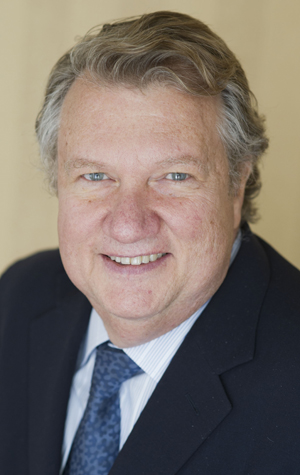Slater Family Endows Behavioral Economics Chair
Will explore psychology of financial decision-making

BU overseer Kenneth Slater and his family have endowed a College of Arts & Sciences chair in behavioral economics, a field that explores, among other things, the ways that players in the financial market make decisions.
“As important as knowledge is about a particular area, what’s more important is what you do with that information,” says Slater, a principal in Tremont Partners LLC, a financial advisory firm in Palm Springs, Fla. “It’s worth learning more about the decision-making process.”
The Slater Family Professorship in Behavioral Economics is created by a $2.5 million endowment made possible by combining funding from the Slater family (nearly $1.7 million) with a matching grant through the Leventhal Challenge ($800,000), established by BU trustee Alan Leventhal (Hon.’09) and his wife, Sherry Leventhal.
Behavioral economics is a relatively new field that explores the psychology behind decisions made by consumers, borrowers, and investors, as well as the effect those decisions—often based on gut instinct—have on the financial market.
“This professorship in behavioral economics is a real game-changer,” says Virginia Sapiro, dean of Arts & Sciences, “because it builds on strengths we already have in the department of economics, one of our leading departments, and enables us to attract another first-rate professor to our ranks. Without endowed professorships like this one, we have little hope of competing with the other top-ranked universities to attract and keep the best faculty and students.”
Robert Margo, a CAS professor and chair of the department of economics, says Slater Family Professorship is the first endowed chair in the department’s history.
“Behavioral economics is one of the hottest areas of research in economics,” Margo says. “By giving us the resources to make a high profile appointment, Ken Slater’s extraordinary gift will help move the department to the next level.”
As a professional investor, Slater has a personal interest in this branch of economics. “I realized one day that that’s all I really do,” he says. “And I can’t decide where to go to lunch.”
Joking aside, Slater’s role became crucial during the recent financial crisis, when few people fully understood what was happening on Wall Street. “Things were pretty stressful,” he says. “I was trying to understand everything, and I realized I couldn’t. I had to make decisions based on limited information.”
Slater came to the realization that answers to his questions were not to be found in the financial information at hand: what he really needed to understand was investors’ decision-making process. His gift is intended to advance that understanding.
The Slater family has now endowed two BU academic chairs. In 2005, Ken Slater’s parents, Alvin Slater (CAS’41) and Shirley Slater, funded the Alvin J. Slater and Shirley Slater Chair in Jewish Holocaust Studies, held by Steven Katz, a CAS professor of religion and director of the Elie Wiesel Center for Judaic Studies.
BU has helped educate several Slaters, among them Ken Slater’s daughter, Jacqueline Slater (GSM’12), and his brother, Richard Slater (CAS’71). Although Ken Slater did not graduate from BU, he has been a member of the CAS Dean’s Leadership Advisory Board since 2007. “I have been delighted that Ken has been willing to give his time to work closely with us in the College of Arts & Sciences,” Sapiro says.
While investing in “bricks and mortar” is important, Slater says, his family sees a different kind of value in endowing an academic chair. “We particularly like the idea of something that lasts, that’s perpetual, that changes over time, and is refreshed or replenished with new intellectual leadership,” he says. “It has an indefinite, unchanging life.”
Leslie Friday can be reached at lfriday@bu.edu; follow her on Twitter at @lesliefriday.
Comments & Discussion
Boston University moderates comments to facilitate an informed, substantive, civil conversation. Abusive, profane, self-promotional, misleading, incoherent or off-topic comments will be rejected. Moderators are staffed during regular business hours (EST) and can only accept comments written in English. Statistics or facts must include a citation or a link to the citation.